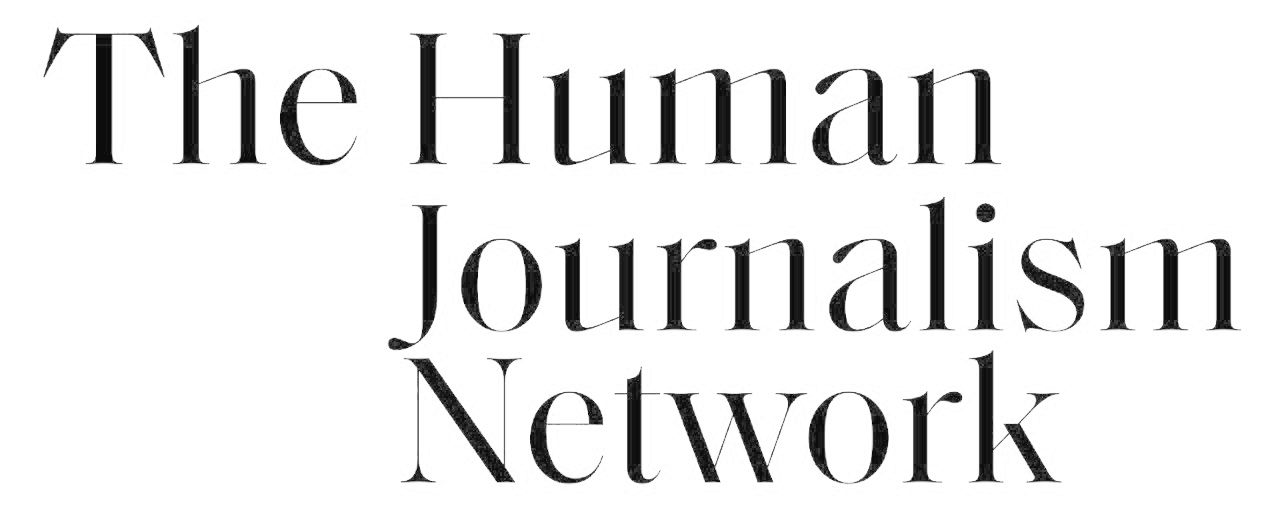In Cuba, more than 45% of women of working age are not economically active; that is, they are neither employed nor seeking employment. The Mentoras Creativas initiative seeks to promote the growth of women entrepreneurs and artists by offering them the assistance of a network of women, tools and training.
Born in Holguin, Cuba, Rebeca Torres had an inclination towards the arts since she was a child. She liked painting, writing and acting, but her shyness always kept her from pursuing them. Years later it was still hard for her to see herself as a creator, although she knew that the sensitivity and the desire to transform and impact others through art were still there.
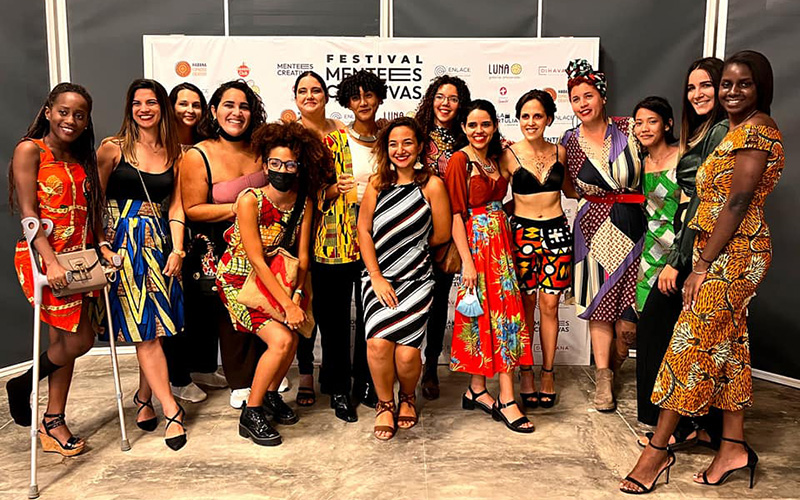
When she was 30 years old, an opportunity came along that gave her a boost to that aspiration: an apprenticeship program organized by Mentoras Creativas, a project that seeks to empower women entrepreneurs and artists. Torres got the necessary mentoring and developed the skills to create and, above all, to write.
“The workshops on brainstorming and creation that I attended helped me to see myself as an artist and to project what I wanted to do in the creative industries. In addition, I learned other tools such as how to create a business model,” Torres explains.
Thanks to what she learned in the programme, she has her first book of poetry in the process of being corrected and she exhibited the photography triptych Matices de empoderamiento in the Creative Mentees Festival in 2022, which takes place in Habana.
Elena Molina and Gabriela Román, founders of Mentoras Creativas, explain that to start the project they invited Latin American and European professionals leading creative teams so that they could share their experiences with the young Cuban women.
Rebeca’s main mentor in the first edition was the Panamanian writer and lawyer Nicolle Alzamora. However, she was particularly captivated by a workshop called “relaxing movements”, taught by the Argentine artist Suyai Otaño. It was about using gestures, colour and poetry to socialise feelings and coping strategies.
Mentoras Creativas: a support network among women
Mentoras Creativas is a social enterprise focused on training, supporting and advising women starting or reorienting their work in the creative industries, where people’s intellect is put to work in devising, producing and distributing cultural and artistic goods and services. The sector includes the arts, architecture, design, advertising, software development, manufacturing activities, and innovation, among others.
Since its establishment in September 2021, the project has had three programs: mentoring, consultancy and internships. In the first one, in which Rebeca Torres participated, for three weeks various speakers shared their expertise to develop skills in entrepreneurship and art, and the consequent inclusion in the job market.
Around 20 women from five Cuban provinces took part in the initiative. One of them was Ana Roxana Díaz, an illustrator and cartoonist who runs the online shop Blacklady like The Sun with her partner, based on the design of stationery, bags, jewellery and decorative items made from recycled materials.
“I learned about marketing, finance and ways to build a community through my business and my personal brand,” says Ana Roxana.
The young entrepreneur also acquired skills that are not usually taught in Cuban schools, such as preparing a curriculum vitae and coaching on how to get good job interviews.
“We had 121 applications for the mentorships, but we could only accept 20, so we decided to have an open program of master classes so that no one would be left out,” says Molina. One premise was key to the whole process: women supporting women.
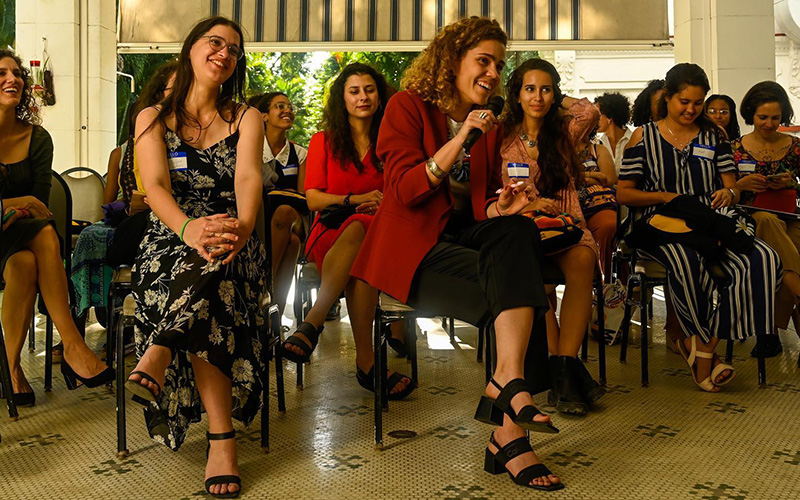
The second program consisted of consultancies, which aimed to offer personalised advice on how to sustain a business. Among these tools were project writing, defining an organisational structure, growth strategy and communication. Gabriela Román and Elena Molina coached and selected women running socially responsible ventures such as Daniela Heredia Sánchez, from Anda Publicitaria. This programme was carried out thanks to the support of the Norwegian Embassy’s Project Fund in Havana.
The internships that took place during May 2022 were another of the initiatives carried out. Its essence was to provide 21 women with four weeks of business internships to gain work experience and, in addition, to help improve the working culture in the industry. According to Molina, Cuba does not encourage competitive applications for jobs, and this is something Mentoras Creativas seeks to change.
The ventures underwent a selection process in which they had to demonstrate their commitment to social responsibility. Fifteen businesses were chosen, and the interns were trained in areas of social media management, fundraising, design and photography. Practices were carried out both face-to-face and remotely.
Host managers also benefited, as “90% of them needed to expand their teams because the business was growing, or because many of their team members had emigrated,” the coordinators explain. When the businesses reviewed the applicants’ applications, five of them wanted more than one intern, and some applied to cover other jobs.
One of the interns selected was Aymara Rodríguez, a Foreign Language Education graduate and owner of La Nube, a hand-embroidered bag shop. She did her internship at Dador —a Cuban clothing brand— and after that period she joined the team. Her goal was to learn and do cutting, sewing and pattern-making —the creation of the garment’s design—.
Rodríguez, who has taken part in all three programs, explains that she has been able to enter the creative world, which was unfamiliar to her because of her teacher training, but to which she has always been drawn.
Some of the ventures that participated in the internship programme were the magazine Afrocubanas, the photography studio My Reguera Studio, Clandestina, the music magazine AM:PM Magazine, BarbarAʼs clothing shop, the company Publicitarias (based in Argentina) and the Brownstone Foundation, based in Paris.
Dainerys Brito, project manager at the Brownstone Foundation, explains that the interns they hosted worked as community managers, created a communication plan, managed to design a visual identity that gave aesthetic uniformity to the foundation’s networks, and also did curatorial work. “The internship programme is very professional, organic and sustainable,” she said.
Meanwhile, Deyni Terry Abreu, one of the leaders of BarbarAʼs Afro-Cuban clothing shop, explains that the experience of her business in the programme allowed them to understand that they were able to apply effective teaching methods to transmit the knowledge they possess. “We managed to keep the two women who worked with us highly motivated at all times.”
How did Mentoras Creativas was born?
Its creators Elena Molina and Gabriela Román are two young Cubans who have been working for more than ten years in the fields of art, visual arts, film, curatorship and cultural management. Mentoras Creativas was the result of their own journey as women in the industry and their participation in foreign initiatives to support female talent. Elena Molina lives in Barcelona and Gabriela Román in London.
In 2020 they collaborated on a feminist event called Locas, Brujas, Raras y Lesbianas, and they realised that in Cuba there were very few female leaders. This gave rise to the idea of a women’s support network, which evolved into professional support in the form of mentoring.
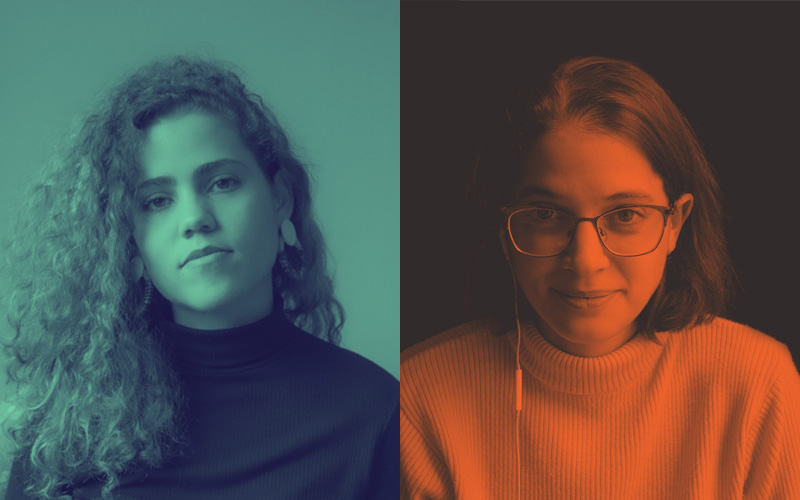
The project was presented to the Chevening Alumni Programme Fund (CAPF), a funding competition in which graduates of the English Chevening scholarship —such as Gabriela’s Román— take part with proposals for social projects. The Mentoras Creativas project was approved and they received funding for the first of the three programmes they have done. They also got support in communication and management. In 2022 they won this grant again.
“The team is quite small, but it has had essential female talents and collaborations. We developed this project remotely and without knowing each other in person, but it is an example of what collaborative networks can do”, explains Molina.
The initiative has had several collaborations: Estudio Clave, in Uruguay, created the brand design and brand management; the Cuban agency Madwoman provided initial support with communications; Jania Ayala was the programme coordinator and Day Martínez is the main designer of the project.
When they first conceived the project, they thought of it for women between 18 and 30 years of age, but they realised the need to include older women or leaders who needed tools to get a foothold. Thanks to technology, they were able to include Cuban women from the rest of the country and not just Havana.
“We should work much more with the transgender community, reach out to them because we want them to join in as well. Mentoras Creativas should be representative of the diversity that exists in Cuba”, they stressed.
The project also aims to have diversity in terms of occupation —university students, high school students, freelancers, employees, students—, racial representation, origin, and age, both in terms of participants and guests. One of the most important aims is to expand in Latin America, which is why the call for mentoring that was launched at the end of 2022 targeted the entire region.
“There are situations that are cross-cutting for all women who want to enter the creative industries and, moreover, in this way we can strengthen our regional community,” explains Román.
The call will focus on the relationship between the creative industries and science, technology, engineering and mathematics. On the other hand, they intend to offer training, talent management and business consulting services, and balance this with other non-profit initiatives that Mentoras Creativas promotes.
Cuban women in the creative industries
The model is changing, and Mentoras Creativas aims to continue driving those changes. Using the phrase as a slogan, the project advocates for the empowerment of Cuban women in the creative industries. But what are we really talking about? What should change?
The creative industries, like most industries worldwide, have historically been shaped and dominated by men. According to a study by the University of Alicante, gender inequalities in the creative industries are manifested not only in the lower employability of women but also in the reinforcement of stereotypes that relegate women to traditional roles (libraries, files, museums), while they connect men to the newer creative tasks (graphic arts, recording, editing, music or film production).
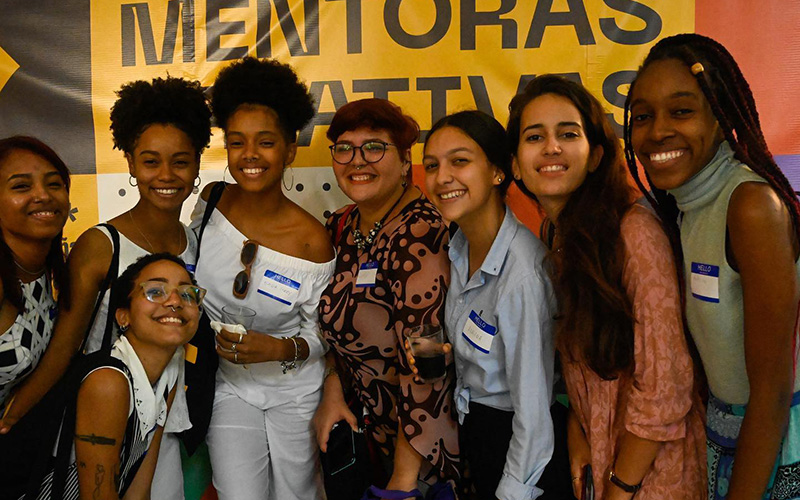
Cuba does not escape this situation. According to the National Statistical Yearbook 2021 of the National Office of Statistics and Information, more than 45% of women of working age are not economically active; that is, they are neither employed nor looking for work. For men, the figure is just over 20 %. One factor that directly influences the fact that more women are economically inactive than men is the fact that it is usually women who take on full-time unpaid activities such as household work and caring for children, the elderly, and sick or dependent persons.
Research in 2019 by Postdata Club shows that women are a minority in several of the highest-paid sectors. It also shows that in areas within the creative industries such as culture, innovation, manufacturing and business services, women are under-represented compared to men.
Curator and art critic Dannys Montes de Oca points out that in the last decades the creative and cultural industries “have changed the way women were historically seen, because they went from being an object of representation to being a subject that represents different notions of gender, racial, social and collective identity, and that channels this through their own concerns”.
“Nevertheless, women continue to be underrepresented in the arts, they have less access to training, exhibitions and artistic promotion in national and local media. In addition, self-referential works continue to be undervalued, and the way in which women’s relationship and presence in the social dynamic is understood is still very precarious,” she added.
Mentoras Creativas aims to influence this reality and empower women to change this situation. “There is a digital explosion that is reshaping the entire Latin American economy, and we want women to take a leading role in the process,” concludes Román.
This story was originally published on the Cuban media El Toque and is republished within the Human Journalism Network program, supported by the ICFJ, International Center for Journalists.
(*) There are no bylines in this case due to risks to freedom of expression and repression against independent journalism in Cuba.
